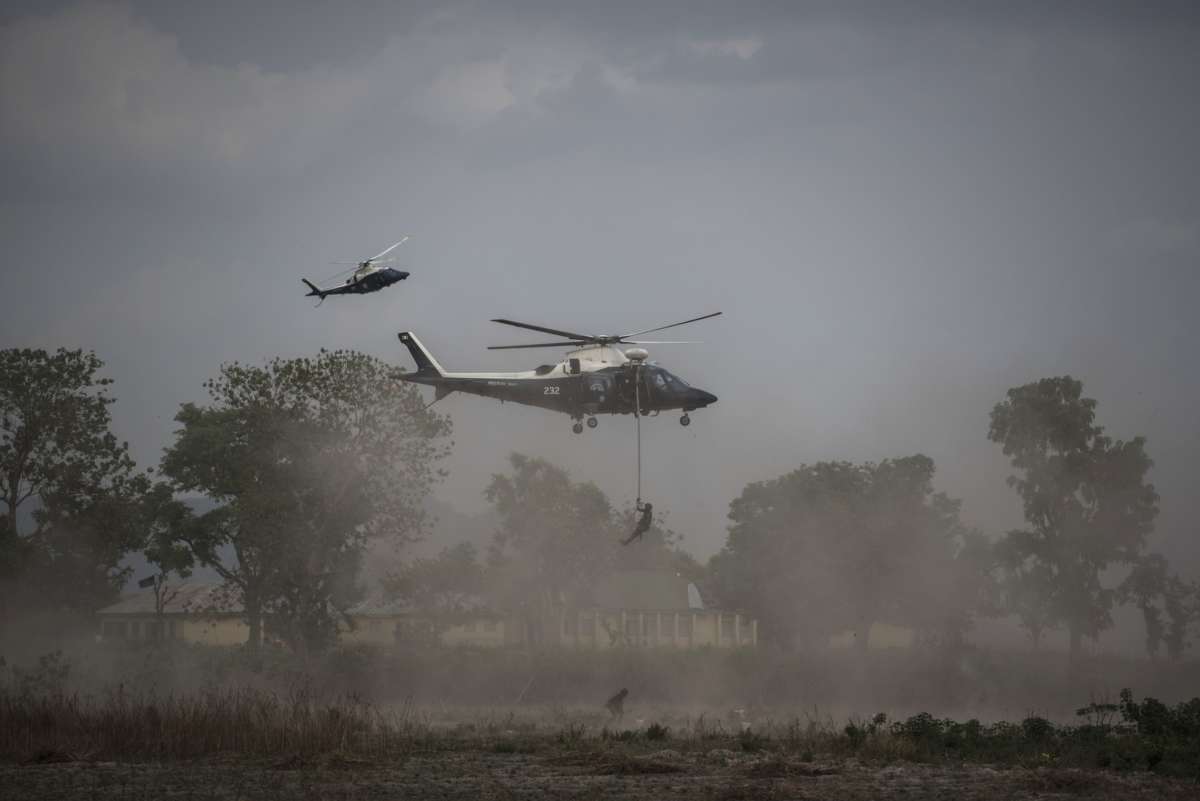This April, the Biden administration approved the sale of 12 AH-1Z Attack Helicopters and other related military equipment to the Nigerian government for $997 million.
U.S. officials claim the sale will support national security objectives by improving Nigeria’s ability to fight the extremist group Boko Haram. But sales of weapons like these come with major human rights risks for the Nigerian population — risks U.S. officials should be taking more seriously.
U.S. lawmakers in Congress had a 30-day window, through May 14, to stop the administration from issuing a Letter of Offer and Acceptance. But they can still adopt legislation to block or modify the sale at any time up to the point of delivery of the military equipment.
Last July, when details of the deal were first presented to lawmakers, they raised concerns about the Nigerian government’s human rights record, which delayed the deal. Now, before letting the sale go forward, Congress should be asking more questions about what assurances the Biden administration has that Nigerians’ rights will not be violated with this new influx of military equipment
The United States says it has partnered militarily with Nigerian forces because it sees Nigeria’s legitimate and serious security concerns, including the Boko Haram insurgency in northeast Nigeria and the burgeoning banditry crisis in the northwest, as a priority for the U.S. as well.
Several states in Nigeria’s northwest region are currently plagued by the activities of armed gangs. Many began as vigilante and militia groups formed to protect their communities during disputes between farmers and nomadic herdsmen over land and other resources, which often escalate quickly and violently, with authorities failing to respond.
Over time, the groups, particularly those affiliated with nomadic herders, morphed into powerful criminal gangs with sophisticated weaponry that kill, pillage, torture, and kidnap people, including school children, for ransom.
The gangs themselves abuse people’s rights. But in responding to them, Nigerian security forces have often violated human rights and killed civilians themselves.
Indeed several incidents, including airstrikes on civilian communities, in February and last September, make clear that Nigerian security forces are not doing enough to minimize civilian casualties when engaging in security operations.
The February airstrike near the country’s border with Niger, which the authorities claimed was an error, killed seven children and injured five more. The September incident killed nine and injured 23. Moreover, Human Rights Watch and other groups have documented Nigerian forces committing gross human rights violations such as arbitrary detention, enforced disappearances, and extrajudicial killings within and outside the context of the nation’s security crises.
The harm Nigeria security forces were causing to Nigerians led then-U.S. President Barrack Obama to block the sale of military equipment to Nigeria in 2015. But President Donald Trump allowed sales to resume.
U.S. authorities have said that the new sale will include training for the Nigerian military on the laws of armed conflict and human rights, and air-to-ground integration, to minimize civilian harm in air operations.
Yet these training sessions have also been provided in the past and we continue to see Nigerian forces causing harm to civilians and violating international law. We continue to see those same Nigerian forces experience no consequences for their actions, which fosters more grievances and helps perpetuate the cycle of conflict.
It’s hard to see the U.S. pledge to educate Nigerian forces on the dos and don’ts of military operations as anything more than a weak attempt to acknowledge human rights risks while going ahead with the arms sales. What’s needed instead is high-level policymaker engagement. Congress needs to be asking tough questions of the Biden administration.
To start, are Nigerian forces doing more harm than good in the fight against Boko Haram by also harming ordinary Nigerians? What plans are in place to track where and how U.S. military equipment is used by Nigerian forces? How will Nigerian authorities hold their forces accountable for harm to civilians?
U.S. policymakers are legally bound to ensure they are not equipping abusive militaries. At this moment, there are serious doubts that this military sale to Nigeria meets that basic standard. For the sake of Nigerians caught in the middle of conflict and insecurity, Congress should press the Biden administration to demonstrate it can do so.
Matching Opportunity Extended: Please support Truthout today!
Our end-of-year fundraiser is over, but our donation matching opportunity has been extended! All donations to Truthout will be matched dollar for dollar for a limited time.
Your one-time gift today will be matched immediately. Your monthly donation will be matched for the whole first year, doubling your impact.
This matching gift comes at a critical time. As Trump attempts to silence dissenting voices and oppositional nonprofits, reader support is our best defense against the right-wing agenda.
Help Truthout confront Trump’s fascism in 2026, and have your donation matched now!
